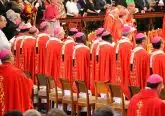Ahead of beatification, priests reflect on McGivney’s priesthood, and the miracle he prayed for
by Christine Rousselle
New Haven, Conn., Oct 30, 2020 / 09:50 pm MT (CNA).-
A prayer vigil for priests on the eve of the beatification of Ven. Michael McGivney took place Friday, October 30, at St. Mary’s Church in New Haven, the parish where McGivney served as a priest and founded the Knights of Columbus in 1882.
The vigil featured reflections from the father of a boy whose miraculous healing has been attributed to McGivney’s prayers.
The prayer vigil was structured around three lessons: Fr. McGivney as a parish priest of action and courage; Fr. McGivney as a model of co-responsible leadership; and Fr. McGivney’s intercession. Each lesson featured a Bible reading, a story about McGivney’s ministry that related to the theme of the lesson, and a reflection.
The first lesson included a passage of McGivney’s remarks from a Mass he celebrated for a condemned prisoner, Chip Smith. Smith had been sentenced to death for murdering a police police chief while in a drunken state, and McGivney met him while ministering to prisoners at the jail in New Haven. McGivney became Smith’s spiritual director, and was with him on the day of his execution.
McGivney’s prison ministry was just one of the ministries he undertook as a diocesan priest, said Msgr. Joseph Donnelly. Donnelly provided the reflection for the first lesson.
The life of a diocesan priest “is characterized largely by activity for the sake of the Kingdom of God in which God’s presence is undeniably real,” said Donnelly.
“It draws us to prayer. It calls us to conversion of heart. It strengthens us in holiness,” he said. “Moreover, it strengthens our experience of the bond we share with God and with those we are called to serve.”
“We belong to them, they belong to us, and together we belong to God,” he said. He asked the priests present if this sentiment sounded familiar, and asked if “our diocesan brother,” McGivney, would agree.
“As I have read and reflected upon the story of his very active life and pastoral ministry, I recognize in Father Michael McGivney’s experience as a parish priest a familiar kinship in serving this diocesan Church,” said Donnelly. He said in particular, two examples from McGivney’s life stood out as examples of how he lived out his vocation as a diocesan priest: the founding of the Knights of Columbus, and his dedication to Smith’s pastoral needs in prison.
The Knights of Columbus was founded as a fraternal and charitable organization initially to assist widows and orphans, many of whom were in McGivney’s own flock.
“Prayerful compassion was at the root of his pastoral response to organize a means of offering much needed support to such families in his parish and beyond,” said Donnelly. “With his vision, skills, energy, and prayer he led the first Knights to establish this global fraternal service order.”
McGivney visited Smith in prison for over a year, and during that time Smith returned to the practice of the Catholic faith.
“As his trial and various legal procedures continued, his conversations with Father McGivney touched something deep in both of them,” said Donnelly. “They both appear to have been profoundly affected by their time together.”
“Who of us has not had similar pastoral relationships that had similar effect on us while at the same time offering us a deeper and richer insight into the meaning of our vocation as diocesan priests,” asked Donnelly. “It strikes me that Father McGivney poured out his life for those he served.”













